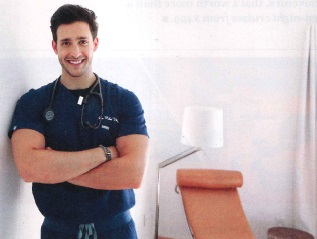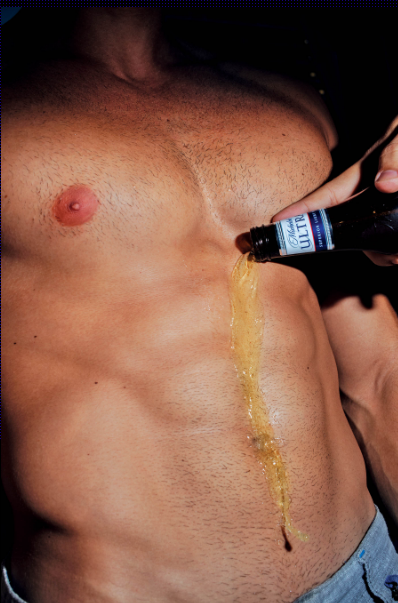Michelob Now Claims that Beer Equals Health
 Doctor Mike likes to work out. Doctor Mike likes to throw himself into his work. Doctor Mike likes to give back to the community. And Doctor Mike likes to drink.
Doctor Mike likes to work out. Doctor Mike likes to throw himself into his work. Doctor Mike likes to give back to the community. And Doctor Mike likes to drink.
This fictional tippling physician is the creation of Michelob Ultra, a low-calorie “super-premium” beer. In a two-page ad spread in Travel & Leisure titled “All in a Day’s Work (and Play),” the doctor is shown in equal parts working out, reaching out, and letting off steam with a drink. It’s all part of megabrewer AB InBev’s plan to equate alcohol with health and exercise.
“The brand is really positioned around this active lifestyle space,” Joe Lennon, brand director for the beer, told Bloomberg Businessweek. “Our target consumer is somebody who makes a conscious effort to live that healthy, active lifestyle but still enjoys time with friends and having a few beers.”
Michelob Ultra follows a growing trend of alcohol manufacturers advertising by claiming their products can promote health, weight loss, or physical activity. These claims fly in the face of the well-studied and well-documented risks of long-term use. Chronic drinking greatly increases the risk liver disease, damage to the heart and circulatory system, multiple forms of cancers, pancreatitis, and stroke. It can also change mood and behavior—making it harder for Doctor Mike to forge the patient bonds the ad says he values, or to deliver a persuasive pitch to raise funds for his charities.

Michelob’s reckless resident also conveniently ignores alcohol’s short-term effects on his own athletic performance. A review in Nutrients detailing the effects of alcohol during and after exercise explained that alcohol in the body disrupts metabolism and protein synthesis, preventing the body from recharging its energy stores and rebuilding muscles. (The authors also note that alcohol itself is treated as an energy source by the body—no matter how “lite” the beer, alcohol is calories.) But athletes don't need to have to look at biochemistry to see the oxymoron within the idea of an "athletic lifestyle" brew. The NCAA distributes educational materials warning of alcohol’s propensity to derail training, citing:
- Dehydration and accelerated fatigue
- Loss of motor skills and strength for up to 72 hours after use
- Increased body fat
- Nutrient deficiencies
- Compromised immune system and delayed healing
- Sleep disruption
All of the above are major impediments to reaching peak athletic form—and in some cases, to simply being happy day-to-day.
With all that in mind, AB InBev’s offers to let its customers (per Bloomberg) “[paddleboard out and] board the Miami party boat in June, jog through New York City in July, or climb a beachside cliff in Southern California in August” are just offers to lose the benefits of their hard work—and in the long run, maybe suffer worse consequences. After all, having graduated medical school, Doctor Mike should already know that physicians fall victim to alcohol disorders just as often as the rest of us.
FURTHER READING: Outside magazine on drinking and exercise.
Torso photo by Eva O'Leary for Bloomberg Businessweek.
Help us hold Big Alcohol accountable for the harm its products cause.
| GET ACTION ALERTS AND eNEWS |
STAY CONNECTED    |
CONTACT US 24 Belvedere St. San Rafael, CA 94901 415-456-5692 |
SUPPORT US Terms of Service & Privacy Policy |


